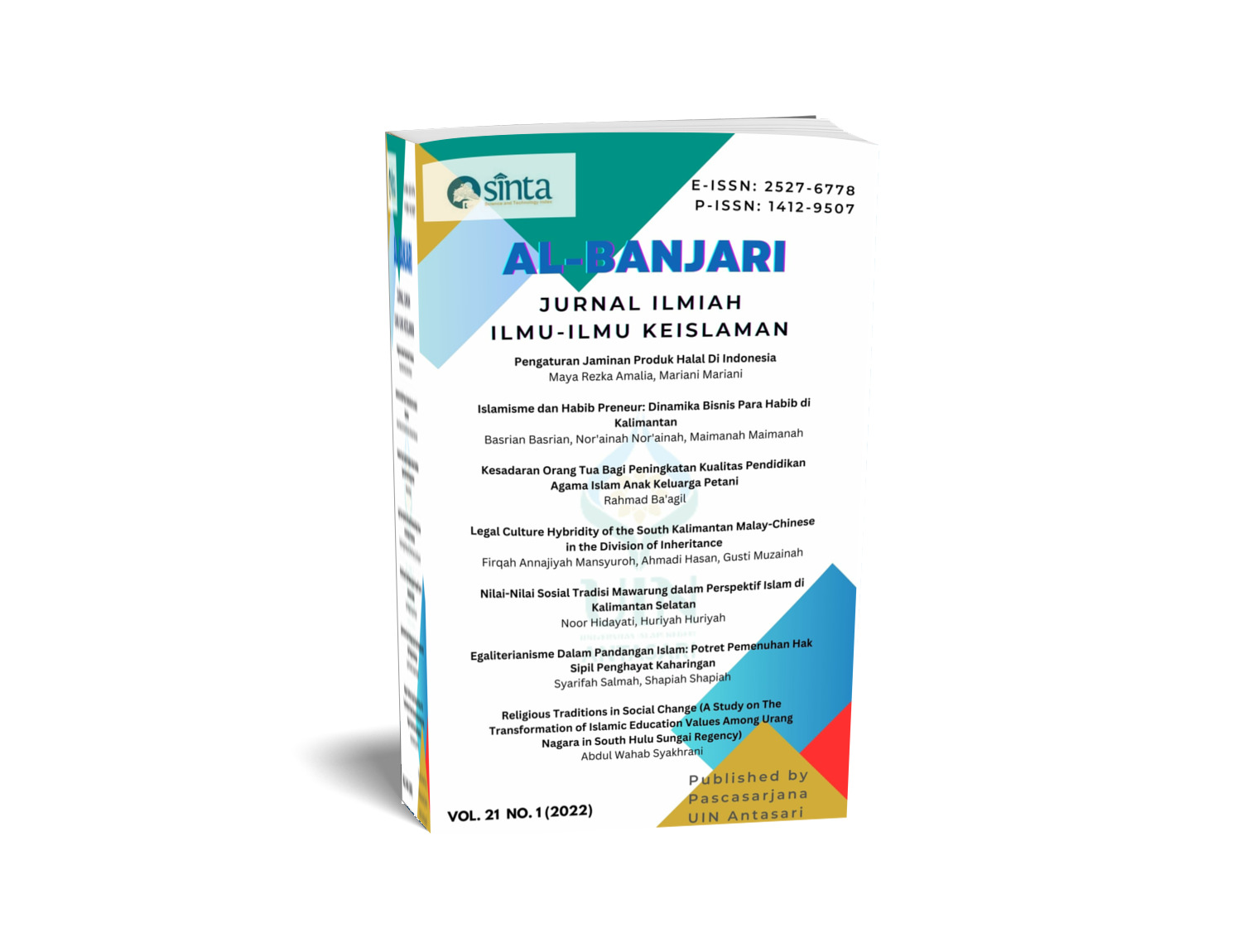Religious Traditions in Social Change (A Study on The Transformation of Islamic Education Values Among Urang Nagara in South Hulu Sungai Regency)
DOI:
https://doi.org/10.18592/al-banjari.v21i1.6991Keywords:
Religious, traditions, social, nagara, educatianAbstract
This study focuses on the transformation of Islamic education values among the Urang Nagara community in South Hulu Sungai Regency. The Urang Nagara community is known for its adherence to traditional religious practices, and this study aims to explore how the community's religious traditions have been impacted by social changes over time. Specifically, the study aims to analyze how Islamic education values have evolved within the community and the role they play in shaping social change. The study employs a qualitative research approach and utilizes data collected through interviews, observation, and document analysis. The data analysis process involves coding and categorizing the data to identify key themes related to the transformation of Islamic education values among the Urang Nagara.In conclusion, this study contributes to the understanding of how religious traditions can be transformed in the face of social change. The findings of this study have important implications for policymakers, educators, and community leaders who seek to preserve the cultural heritage and religious traditions of their communities while also adapting to changing social and technological contexts. Studi ini berfokus pada transformasi nilai-nilai pendidikan Islam di kalangan masyarakat Urang Nagara di Kabupaten Hulu Sungai Selatan. Masyarakat Urang Nagara dikenal karena ketaatan mereka terhadap praktik-praktik agama tradisional, dan studi ini bertujuan untuk mengeksplorasi bagaimana tradisi agama mereka terpengaruh oleh perubahan sosial dari waktu ke waktu. Secara khusus, studi ini bertujuan untuk menganalisis bagaimana nilai-nilai pendidikan Islam berkembang dalam masyarakat tersebut dan peran yang mereka mainkan dalam membentuk perubahan sosial.Studi ini menggunakan pendekatan penelitian kualitatif dan menggunakan data yang dikumpulkan melalui wawancara, observasi, dan analisis dokumen. Proses analisis data melibatkan pengkodean dan pengkategorian data untuk mengidentifikasi tema-tema kunci yang terkait dengan transformasi nilai-nilai pendidikan Islam di kalangan masyarakat Urang Nagara. Temuan dari studi ini mengungkapkan bahwa masyarakat Urang Nagara telah mengalami perubahan yang signifikan dari waktu ke waktu, terutama dalam hubungannya dengan tradisi agama mereka dan praktik nilai-nilai pendidikan Islam. Studi ini mengidentifikasi sejumlah tema kunci, termasuk evolusi praktik agama tradisional, dampak faktor eksternal pada tradisi agama, dan perubahan peran pendidikan Islam dalam membentuk perubahan sosial.Kata Kunci: Agama, tradisi, sosial, Nagara, pendidikanReferences
Ardiansyah, Syaifuddin Iskandar. “Konflik Etnis Samawa Dengan Etnis Bali: Tinjauan Sosial Politik Dan Upaya Resolusi Konflik.” Journal Unair Tahun 23 (2010).
Arifin, M. Zainal. “The Traditionalism Of The Islamic Boarding School Education System In The Era Of Modernization.” Scaffolding: Jurnal Pendidikan Islam Dan Multikulturalisme 4, No. 1 (2022): 286–396.
Bernards, Monique, And John Nawas. “The Geographic Distribution Of Muslim Jurists During The First Four Centuries Ah.” Islamic Law & Society 10, No. 2 (June 2003): 168–181.
Eliza, Eliza, And Hudaidah Hudaidah. “Proses Islamisasi Dan Perkembangan Islam Di Kesultanan Banjarmasin.” Heuristik: Jurnal Pendidikan Sejarah 1, No. 2 (2021): 54–62.
Ghozali, M. Hafidz And Others. “Hubungan Agama Dan Negara Studi Atas Muqaddimah Ibn Khaldun.” Uin Sunan Kalijaga Yogyakarta, 2009. Accessed March 6, 2017. Http://Digilib.Uin-Suka.Ac.Id/2521/.
Hafidzi, Anwar, Syafrida Hafni Sahir, Ixsir Eliya, Fitri Ariani Siregar, And Budi Agung Sudarmanto. “The Perception And Impact Of Covid-19 News On The Society.” Profetik: Jurnal Komunikasi 14, No. 1 (2021): 36–50.
Hidayatulloh, Hidayatulloh. “Realasi Ilmu Pengetahuan Dan Agama.” Proceedings Of The Icecrs 1, No. 1 (2017). Accessed March 17, 2017. Http://Ojs.Umsida.Ac.Id/Index.Php/Icecrs/Article/View/627.
Jumriani, Jumriani, Bambang Subiyakto, And Syaharuddin Syaharuddin. “Social Interaction Sasirangan Traders Village In The City Of Banjarmasin As A Learning Resources On Social Studies.” The Innovation Of Social Studies Journal 1, No. 1 (2019): 65–77.
Jumriani, Jumriani, Syaharuddin Syaharuddin, Ersis Warmansyah Abbas, Mutiani Mutiani, And Muhammad Rezky Noor Handy. “The Traditional Clothing Industry Of Banjarmasin Sasirangan: A Portrait Of A Local Business Becoming An Industry.” Journal Of Socioeconomics And Development 4, No. 2 (2021): 236–244.
Letak, Penata, And Muhammad Tisna Nugraha. “Potret Kampung-Kampung Pendatang Di Banjarmasin” (N.D.).
Mahfika, Mahfika, Luthfi Luthfi, And Nurmelati Septiana. “Analisis Tataniaga Gumbili Nagara Di Kecamatan Daha Selatan Kabupaten Hulu Sungai Selatan.” Frontier Agribisnis 5, No. 4 (2021).
Nafis, Moh Durrul Ainun. “Harmonisasi Tradisi Di Tengah Modernitas Umat: Kajian Fenomenologi Terhadap Akad Nikah Samin Kudus.” Al-Adabiya: Jurnal Kebudayaan Dan Keagamaan 16, No. 2 (2021): 141–156.
Siti, Najat Sa’adah. “Etos Kerja Perajin Gerabah Di Desa Bayanan Kecamatan Daha Selatan Kabupaten Hulu Sungai Selatan.” (2015).
Downloads
Published
Issue
Section
License
Copyright (c) 2022 Al-Banjari : Jurnal Ilmiah Ilmu-Ilmu Keislaman

This work is licensed under a Creative Commons Attribution-ShareAlike 4.0 International License.
Authors who publish with this journal agree to the following terms:
- Authors retain copyright and grant the journal right of first publication with the work simultaneously licensed under a Creative Commons Attribution License that allows others to share the work with an acknowledgement of the work's authorship and initial publication in this journal.
- Authors are able to enter into separate, additional contractual arrangements for the non-exclusive distribution of the journal's published version of the work (e.g., post it to an institutional repository or publish it in a book), with an acknowledgement of its initial publication in this journal.
- Authors are permitted and encouraged to post their work online (e.g., in institutional repositories or on their website) prior to and during the submission process, as it can lead to productive exchanges, as well as earlier and greater citation of published work (See The Effect of Open Access).


































